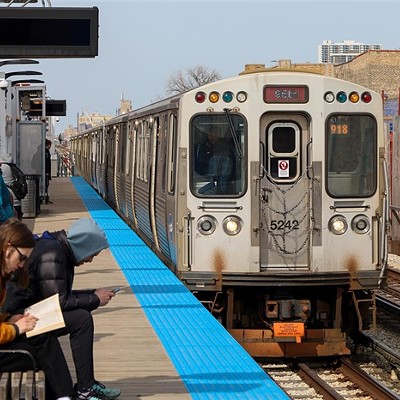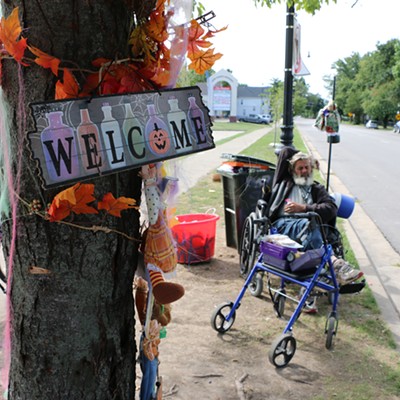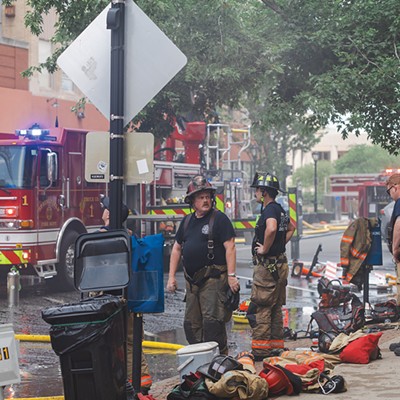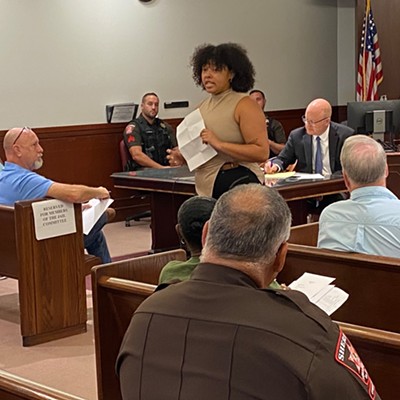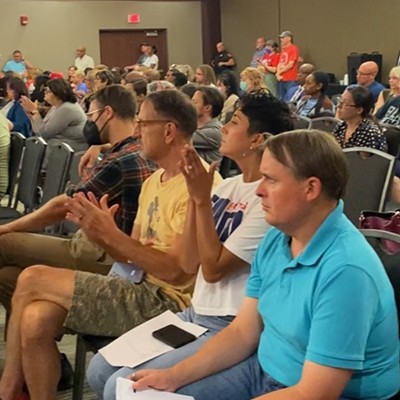
The Springfield City Council delayed a vote Sept. 3 on a controversial ordinance that would make “public camping” illegal and heard three hours of complaints from people who said the measure would be counterproductive and cruel to people experiencing homelessness.
“This is not a motivation to get off the streets,” Joshua Leingang told the council during public comments on the ordinance after council members voted unanimously to move the proposal to the Sept. 10 committee-of-the-whole meeting for more discussion.
Citizen Jack Paciolla said the ordinance would legalize “Gestapo-like tactics,” and Jenna Broom said, “Shame on anyone who supports this.”
The ordinance, which attracted scorn on public media and resulted in online personal attacks against the cosponsors, Mayor Misty Buscher and Ward 5 Ald. Lakeisha Purchase, was proposed to protect the public safety of “campers,” or unhoused people, Buscher said.
Violators would be given 24 hours’ notice before being asked to move and would be subject to progressive fines of $75 to $750 and up to two years in jail.
Josh Sabo, executive director of Heartland HOUSED, told Illinois Times the ordinance is similar to local ordinances that are being adopted in municipalities around Illinois and throughout the country in the wake of a June ruling by the U.S Supreme Court involving an Oregon city.
“I am convinced that criminalizing homelessness doesn’t solve it,” Sabo said. “We need to move forward very carefully so we don’t make the problem worse instead of better.”
Springfield’s proposed ordinance was based on a model ordinance drafted by the Illinois Municipal League since the court ruling. Similar ordinances have been debated in Peoria and adopted in the Tazewell County communities of Pekin and Morton.
Most in the overflow crowd of 150 people clapped and cheered when citizens who spoke to the council said the ordinance would punish people for being in poverty. Speakers said the plan would create fines and criminal records that would hinder the ability of unhoused people to move into stable housing and escalate tensions with local police agencies at a time when mistrust has grown after the July 6 police-involved shooting death of Sonya Massey inside her home in unincorporated Woodside Township.
Protestors said an informal “town hall” meeting is needed to allow a more wide-ranging discussion of issues raised by the ordinance and to allow citizens to question city officials and receive answers.
Complaints also focused on the fact the ordinance initially was scheduled for emergency passage, meaning it would have bypassed the traditional several weeks it takes for a first reading, discussion by the council’s committee-of-the-whole and final approval at a regular council meeting.
The council decided at the beginning of the Sept. 3 meeting, before public comments began, to abandon the possibility of emergency passage when Buscher said the concept has created “angst” in the community.
She said emergency passage was initially considered because of two recent incidents at an encampment at North Fifth Street and North Grand Avenue, the first a fatal drug overdose of a woman staying at the site and then a motorist who allegedly intentionally drove into a group of people Aug. 29.
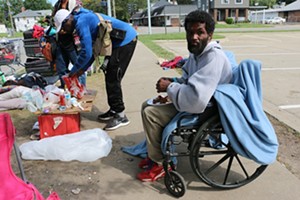
In the long term, the intent was for the ordinance to give police the authority to use a “therapeutic nudge” with unhoused individuals so they would work with social-service agencies to obtain housing, economic assistance and mental-health or substance-abuse treatment, according to Police Chief Kenneth Scarlette.
The ordinance would be enforced rarely and at the discretion of police, Buscher said.
Scarlette said: “We’re not in the business of trying to get money from homeless individuals. I’m certainly not in the business of trying to take them to jail. … It’s about getting them the services they need.”
Police officer Chris Jones, one of the first members of Springfield’s homeless outreach team, said the team is modeled after a similar program in Wichita, Kansas. Wichita police never have had to cite or arrest anyone for violations of that city’s public camping ordinance, but Jones said the existence of the local law helps police convince people experiencing homelessness to accept services.
About 1,200 homeless people receive services in Sangamon County each year, Sabo, of Heartland HOUSED, said. Some are moved into housing, but they are replaced by more people who move through the area or become homeless and need services.
At any point in time, about 390 people are homeless in Springfield and the rest of Sangamon County, Sabo said. That number refers to people in shelters or outdoors in unsheltered settings.
A news release from Heartland HOUSED said the Springfield & Sangamon County 2022-2028 Strategic Plan to Address Homelessness was completed in late 2022 “and is our first comprehensive, communitywide framework to work toward functionally ending homelessness. Much work remains to create a community where the experience of homelessness is rare, brief and non-recurring, but the collaborative efforts we have seen between organizations and government partners has been a promising sign.”
Purchase is a cosponsor of the ordinance because there are several homeless encampments in her ward, and she has felt pressure from neighborhood associations to do something about the sites, Buscher said.
“I get pressure in the mayor’s office all the time from businesses,” Buscher said. “I have never had a business call the mayor’s office and say, ‘Would you please let people camp in front of us?’ But I’ve had lots of them call me and say, ‘People are camping in front of my business. You need to move them.’ And we have to say we can’t by law, and that frustrates them and upsets them.”
Buscher said people who have “trashed” her on social media “have no idea what I walk through on a daily basis.” She said she has a brother in the area “who is homeless all the time. My brother does have an addiction, and he doesn’t want to live by rules, and he doesn’t want to work. He would love for you to give him a place to live and use, but that’s not reality.”
Several homeless people camped out in the public right-of-way on the east side of North Fifth Street, just south of North Grand Avenue in Springfield, said they don’t want to be forced to leave and oppose the proposed ordinance.
Heather “Megan” Cochrane, 48, said she is working with a social-service agency to get into stable housing, “but it’s not happening fast enough.”
She said she doesn’t want to go to the Helping Hands shelter near South Dirksen Parkway because it’s too far from St. John’s Breadline at 430 N. Fifth St., where she likes to eat. She said she likes to be outside.
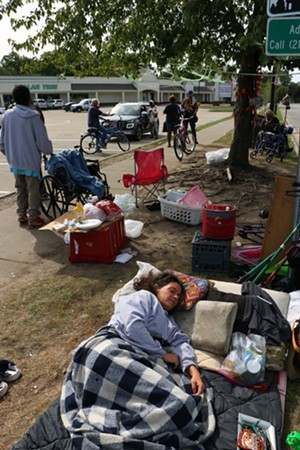
"Here you can be free,” Cochrane said.
Maceo Euells, 42, said volunteers sometimes bring food for him and the other unhoused people in the group, and most people don’t bother them.
“It’s a free country,” he said, adding that he is waiting on documentation – including a birth certificate and Social Security card – that can help him get a slot in public housing.
Tommy Keller, 63, said he, too, is working with an agency to get into housing.
Keller, who said he has been homeless almost five years, said he hopes he isn’t forced to move.
“I’m crippled,” he said. “I can walk, but not very far.”
Looking at a handful of other unhoused adults at the campsite, he said: “These are my friends. I love it here.”



